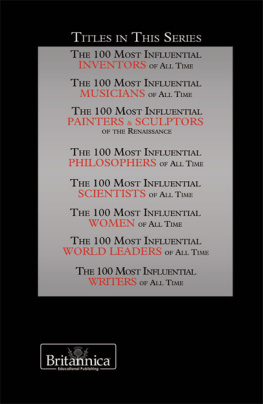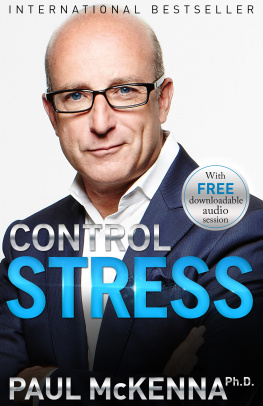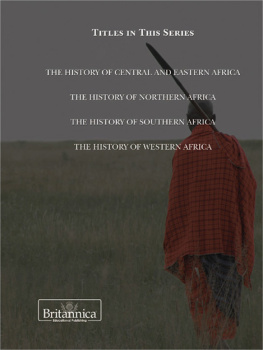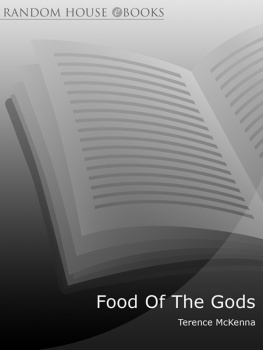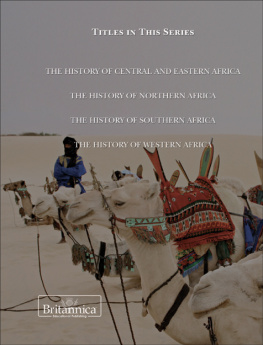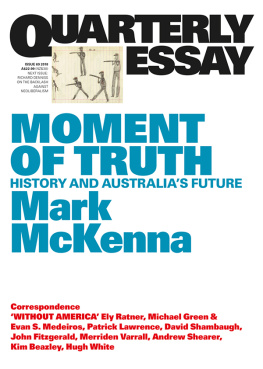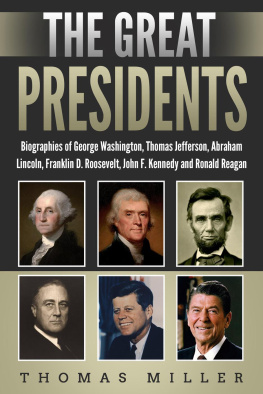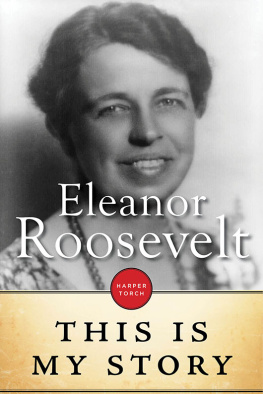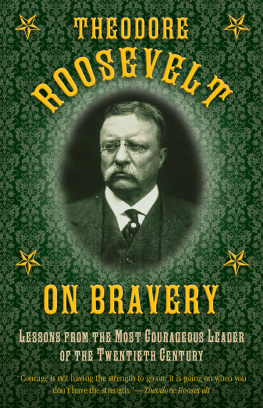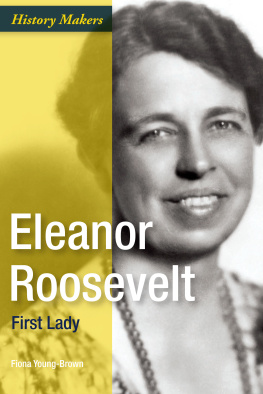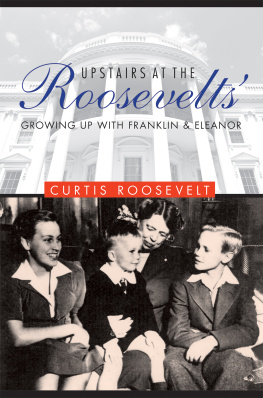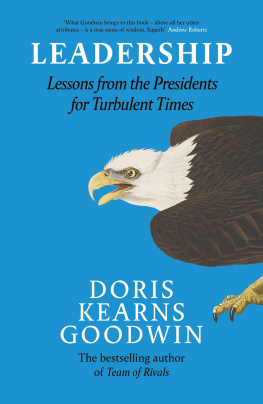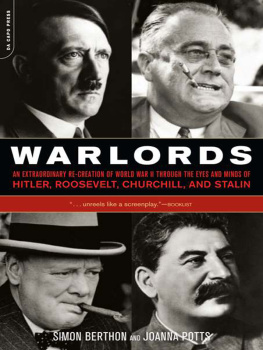THE 100 MOST INFLUENTIAL
WORLD LEADERS
OF ALL TIME
THE BRITANNICA GUIDE TO THE WORLDS MOST INFLUENTIAL PEOPLE
THE 100 MOST INFLUENTIAL
WORLD LEADERS
OF ALL TIME
EDITED BY AMY MCKENNA, SENIOR EDITOR, GEOGRAPHY AND HISTORY

Published in 2010 by Britannica Educational Publishing
(a trademark of Encyclopdia Britannica, Inc.)
in association with Rosen Educational Services, LLC
29 East 21st Street, New York, NY 10010.
Copyright 2010 Encyclopdia Britannica, Inc. Britannica, Encyclopdia Britannica, and the Thistle logo are registered trademarks of Encyclopdia Britannica, Inc. All rights reserved.
Rosen Educational Services materials copyright 2010 Rosen Educational Services, LLC.
All rights reserved.
Distributed exclusively by Rosen Educational Services.
For a listing of additional Britannica Educational Publishing titles, call toll free (800) 237-9932.
First Edition
Britannica Educational Publishing
Michael I. Levy: Executive Editor
Marilyn L. Barton: Senior Coordinator, Production Control
Steven Bosco: Director, Editorial Technologies
Lisa S. Braucher: Senior Producer and Data Editor
Yvette Charboneau: Senior Copy Editor
Kathy Nakamura: Manager, Media Acquisition
Amy McKenna: Senior Editor, Geography and History
Rosen Educational Services
Hope Lourie Killcoyne: Senior Editor and Project Manager
Nelson S: Art Director
Matthew Cauli: Designer
Introduction by Michael I. Levy
Library of Congress Cataloging-in-Publication Data
The 100 most influential world leaders of all time / edited by Amy McKenna, senior editor.
p. cm.(The Britannica guide to the worlds most influential people)
In association with Britannica Educational Publishing, Rosen Educational Services.
Includes index.
ISBN: 978-1-61530-059-4 (eBook)
1. World history. 2. Biography. 3. Heads of stateBiography. 4. StatesmenBiography.
5. PoliticiansBiography. 6. Social reformersBiography. 7. Political activistsBiography.
8. Religious leadersBiography. 9. LeadershipCase studies. 10. Influence (Psychology)
Case studies. I. Title: One hundred most influential world leaders of all time.
D21.3.A13 2010
321.00922dc22
2009030358
On the cover:Marking his 100th day as the 44th president of the United States, Barack Obama, the first African American to hold the office, speaks during a town hall meeting at Fox Senior High School in Arnold, Mo., April 29, 2009. Saul Loeb/AFP/Getty Images
CONTENTS

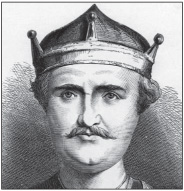
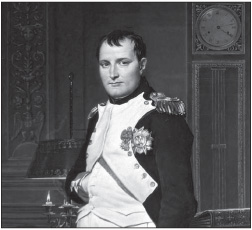

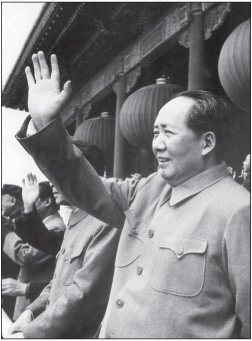

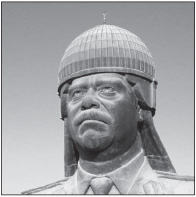
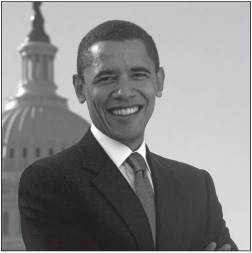
INTRODUCTION
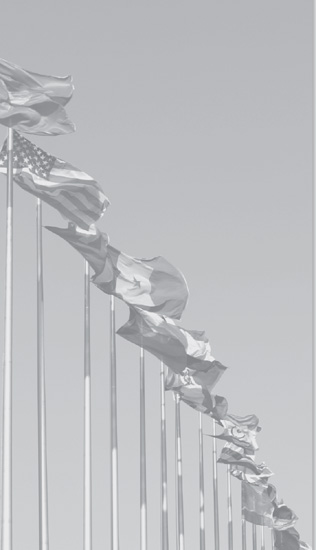
What does it mean to be a leader? Does it require that a person hold political office and rule masses? Does it include only those who made a positive impact on society or also those who wreaked devastation and destruction? Do humanitarians or activists who never held office but who had the ability to stir thousands and millions with a vision of a different, better world merit inclusion?
Many very different types of leaders are profiled in this book, which is arranged chronologically by date of birth. It ends with Osama bin Laden and Barack Obama. One is a mastermind of terrorist acts that have killed thousands and another a politician who overcame the weight of hundreds of years of slavery and discrimination against blacks to become the first African American elected president of the most powerful country in the world. They are opposites in almost every imaginable way. Bin Laden leads a global jihad against Western values, and Obama, the symbolic leader of the West, was the recipient of the 2009 Nobel Peace Prize. They are linked, however, in their ability to inspire loyal followersin bin Ladens case to commit destruction and in Obamas to believe that ordinary citizens, acting together, can change a sometimes seemingly bleak world for the betterand in their lasting impact on the world in which they and future generations will live.
The world today has some 6.7 billion people, most of whom adhere to one religion or another. In the 13th century BCE, Moses delivered his people from Egyptian slavery and received the Ten Commandments, establishing Judaism as the worlds first great monotheistic religion. Although Jews make up but a small fraction of the worlds population today, monotheism flourishes, with Christians and Muslims together accounting for more than half the worlds population.
Jesus Christian followers were once persecuted by the Romans until Constantine I the Great became the first Roman emperor to convert to Christianity; now, more than two billion people call themselves Christians. In the 7th century Muhammad founded Islam, and he is considered by Muslims to be the last of the Great Prophets; his name is now invoked several billion times a day by nearly 1.5 billion Muslims around the world. Others, such as Confucius in 6th5th-century-BCE China and Buddha in the area around Nepal and India about the same time, have inspired hundreds of millions of people, and their teachings remain central to the daily lives of vast numbers today. And, though these figures still have relevance thousands of years after their deaths, the world continues to produce religious leadersMartin Luther and his Reformation in Europe, Ruhollah Khomeini and his Islamic Revolution in Iran, John Paul II and his more than 25-year leadership as head of the Roman Catholic Church, and the Dalai Lamawho have represented challenges to existing religious views or have spread the reach of their religious doctrine.
While some have founded religions, others have founded countries. George Washington is almost universally revered in the United States as the Father of His Country, securing independence on the battlefield and then turning down an offer to become king. The American Revolution began the process of independence in the so-called New World, which had been subject to colonial domination by European powers. Less than 40 years after the American Revolution had been won, another American revolution of sorts, led by Simn Bolvar in Latin America, helped throw off Spanish rule there. Bolvars name is still a symbol to revolutionary leaders in Latin America. Indeed, Hugo Chvez leads his own Bolivarian Revolution in Venezuela today.
In Europe, too, new countries were formed in what are generally thought of as ancient landsGiuseppe Garibaldi helped create a unified Kingdom of Italy in 1861, while Otto von Bismarck helped forge a German empire in 1871. Old empires fell away and were replaced with modern states in the 20th century. Vladimir Lenin established in Russia the worlds first communist regime, one that, though it collapsed nearly 75 years later, continues to have a lasting influence on our world. Out of the ashes of the Ottoman Empire, Kemal Atatrk helped found modern Turkey. Eamon de Valera won Irish independence from Great Britain. Ibn Sad created a country, Saudi Arabia, that bears his familys name. And, Mao Zedong led a 30-year struggle in China, creating a communist state in 1949 that 60 years later continues to rule over the worlds largest population. Sometimes individuals have led peaceful resistance movements that have freed their peopleas Mohandas Gandhi did in India. After World War II, as peoples yearned to become free, David Ben-Gurion in Israel, Kwame Nkrumah in Ghana, Julius Nyerere in Tanzania, and Ho Chi Minh in Vietnam fought for and achieved their countrys independence in different ways. Nelson Mandela in South Africa is yet another story of resistancesometimes armed and sometimes peaceful. He was jailed from 1964 to 1990 by his apartheid government, which legally discriminated against the overwhelmingly black population in favour of minority whites, before being released, helping end apartheid, ushering in a peaceful transition to democracy, and becoming the first black president of the new, multiracial South Africa.
Next page
